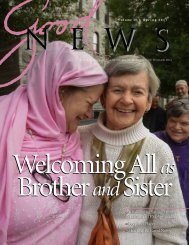Inside
1PGOBwS
1PGOBwS
- No tags were found...
You also want an ePaper? Increase the reach of your titles
YUMPU automatically turns print PDFs into web optimized ePapers that Google loves.
Sister Mary Killoran greets inmate<br />
Catherine Culp during a catechism class<br />
at the Delores J. Baylor Correctional<br />
Institution in New Castle, Delaware.<br />
Sister Mary meets regularly with<br />
Catherine to pray and talk about the<br />
challenges of being imprisoned.<br />
continued from page 13<br />
“I obviously don’t condone what they did but<br />
I believe in them and that they want to move<br />
forward with their lives and succeed.”<br />
A Program with Positive Results<br />
Tom*, one former inmate who served an<br />
eight-year prison term at Howard R. Young,<br />
experienced Sister Mary’s acceptance and<br />
respect on a regular basis. Tom attended the<br />
basic and advanced AVP workshops and<br />
eventually became a trainer who worked with<br />
Sister Mary and other community volunteers<br />
for seven years. “She’s someone who gives<br />
affirmations and lets people know when<br />
they’re doing a good job,” Tom said. “Those<br />
things are so important when you’re in that<br />
kind of environment and you’re feeling like<br />
your life has just been ruined.”<br />
*Name changed for anonymity<br />
14 14<br />
Maria Zakrociemski (far right) translates for two<br />
Spanish-speaking inmates during a catechism class<br />
at the Delores J. Baylor Correctional Institution.<br />
Maria, a practicing Catholic, attends the weekly<br />
class regularly at the prison.<br />
Held on weekends, the AVP basic workshops<br />
focus on five themes: affirmation, communication,<br />
cooperation, transforming power,<br />
and community building. Tom, who now<br />
runs an educational software company, said<br />
he still uses the skills he learned from the<br />
AVP. “I honestly believe you get more out of<br />
it as a trainer because you get reinforced on<br />
the communications and conflict resolution<br />
skills that you’re teaching,” he said. “Those are<br />
things I’ve been able to use here on my job<br />
when issues with employees come up.”<br />
Sister Mary explained that the weekend program<br />
is voluntary for prisoners and trainers.<br />
“We say the first night, ‘You don’t have to be<br />
here. You can leave if you want to,’” she said.<br />
“If anybody has an attitude, it usually dissipates<br />
because it’s not a program where we’re<br />
doing teaching. It’s experiential.”<br />
Sister Mary feels that the men enjoy the experiential<br />
aspect of the workshops. “The exercises<br />
are interesting and there’s a lot of humor<br />
in them,” she said. “You see these big men<br />
laughing and carrying on, doing silly games<br />
you play with children—but it really gets their<br />
energy going.”<br />
Feedback from the participants is overwhelmingly<br />
positive. “They seem to appreciate it a<br />
great deal,” Sister Mary said. “I enjoy it when<br />
they say, ‘This is the best program I’ve ever<br />
been in.’ I see them connecting with each<br />
other and having fun and also learning. And



